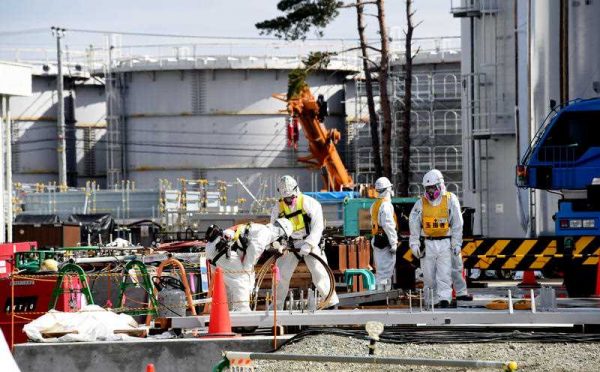The drain leads to open seawater. It was thus suspected that contaminated water may have leaked into the sea, although TEPCO found ‘no increase in radioactivity’ in the seawater in the area.
This is just one episode in a series of many adverse events in Japan’s nuclear industry that have been reported in the past four years. But this particular incident was worse than usual because TEPCO was aware of the high level of radioactivity in the drain but failed to notify either the Nuclear Regulation Authority or the local government.
It was also very bad timing. After long negotiations with the local fishing industry, TEPCO was about to release some of the accumulated radioactive groundwater, which had been cleaned through a water treatment process, into the Pacific. On 25 February, the local fishing industry association heavily criticised TEPCO. Hiroyuki Sato, the chairman of the Soma-Futaba Fisheries Cooperative Association, said that ‘trust has been lost’.
This lack of trust is the fundamental problem that underlies the challenges facing Japan’s nuclear industry since the Fukushima disaster in 2011. The public has lost faith in nuclear safety regulation. Faith has not been fully restored even after a new independent Nuclear Regulatory Authority was established in 2012 and new, much tougher regulatory standards were introduced. According to polling conducted by Hirotada Hirose of Tokyo Women’s Christian University, the share of the public that wants to shut down all nuclear power plants immediately actually increased from 13.3 per cent in June 2011 to 30.7 per cent in March 2013. The same polling data also suggested that about 80 per cent of the public still believed that serious nuclear accidents will happen again in Japan.
In the latest polling undertaken by Nikkei Shimbun in August 2014, the share of the public who oppose the restarting of existing reactors rose to 56 per cent, an increase of 4 percentage points from previous polling on this question. The same polling indicated that 61 per cent of the public were willing to accept higher electricity prices if existing nuclear power plants remained closed. Hirose’s polling also suggested that government agencies were considered to be the ‘most untrustworthy’ organisations of those that were listed.
This loss of trust is the most serious challenge that nuclear policymakers and the nuclear industry now face in Japan. Even four years after the accident, it has not been addressed adequately.
What can Japan do to restore this trust? The best strategy is, of course, honesty. Transparency in policymaking is essential. The public needs to be involved in decision making. Japanese public discourse also urgently needs an independent and unbiased organisation that can provide the public with trustworthy information. Such an organisation could also check and validate data, and the practices of government and industry.
The current Japanese policy debate is completely polarised between advocates for and opponents against nuclear energy. An independent organisation is required to help adjudicate between the two sides, and it needs to be one that the public can trust. It should be established soon. Meanwhile getting independent and unbiased expert information to the public on the subject of nuclear power is a challenging priority.
Tatsujiro Suzuki is Professor and Vice-Director of the Research Centre for Nuclear Weapons Abolition at Nagasaki University, Japan. He is former vice chairman of Japan’s Atomic Energy Commission.

